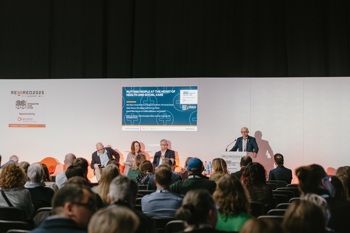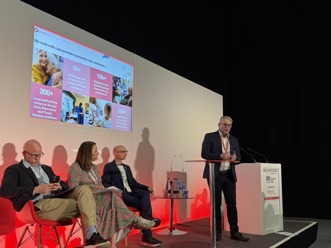
This year’s event came at a critical juncture. As we await the announcement of the government’s long-term NHS strategy, conversations across both days of Rewired reflected key themes likely to shape the 10-year plan – from integrated care and workforce sustainability to AI, data access and digital inclusion.
As proud co-headline sponsors, The Access Group had the opportunity to speak with attendees, join important discussions, and listen to thought leaders driving innovation across the health and social care landscape. From the clinical frontline to board-level insights, Rewired 2025 offered a powerful look at the sector’s evolving digital maturity – and what’s needed next.
Here are the standout themes and key takeaways that personally resonated with us at the event:
Day One Highlights

Rethinking the Role of AI in Real-World Healthcare
AI took centre stage across day one’s major sessions, but this year’s focus felt refreshingly grounded in clinical reality. During the AI in Practice: Real World Use Cases session, Dr Gerald Lip, Clinical Director for Breast Cancer Screening and NHS Grampian and Vice-Chair, shared compelling results from breast cancer screening trials involving over 600,000 women across Europe. These studies showed up to a 30% increase in cancer detection, alongside faster results and fewer false positives. However, he cautioned that “AI must be monitored with clinical rigour. Women’s lives are at stake.”
During the same session, Microsoft’s David Bachmeier lifted the lid on the NHS pilot of Copilot, the generative AI assistant built into Microsoft 365 and our own Access Intelligent Care Platform (AICP). With 20,000 NHS staff testing the tool, early results are promising—showing boosts to productivity, creativity and clinical admin support.
AI-fuelled feedback and analytics were also explored, with real-world examples from Smart Triage and Careful AI, where natural language processing tools were used to surface systemic issues from patient feedback—spotting trends across PALS (Patient Advice and Liaison Service) data and even repeated concerns around individual clinicians.
The AI Bake Off session added a fun but critical take on AI in healthcare, testing tools like ChatGPT against real clinicians in simulated scenarios. From triage to medication conversion, results showed clear gaps in reasoning and clinical safety—reinforcing the need for ethical, transparent, explainable systems if AI is to support real-world decision-making.
Putting People First: Workforce Wellbeing in a Digital Age
While AI dominated the headlines on day one, the Leadership and Teams stage brought the spotlight back to the people behind the system—both patients in crisis and the professionals providing care.
Human-centred design and frontline resilience emerged as critical threads, reminding us that digital progress must support—not sideline—the workforce. That message came through powerfully in the session Using Digital to Protect the Mental Health and Wellbeing of the NHS Workforce, which brought refreshing honesty to the toll the current system takes on clinicians and care teams. With burnout still widespread post-pandemic, speakers including Dr Ben Tometzki and Dr Ameet Bakhai, called for more joined-up digital health strategies—ones that genuinely make work easier, not harder.
Workforce-focused technologies, such as wellbeing apps like Headspace and shift planners like Patchwork, were showcased as tools to support staff in managing stress, sleep and work-life balance. Dr Bakhai introduced the concept of “technostress”, highlighting the strain clinicians face from being constantly connected, especially through after-hours email.
As part of the NHS DigiWell trial, the AirEmail tool was shown to reduce email-related stress by 13%, offering staff more control over digital communications. As Dr Bakhai put it, “We’re in it for the people, we didn’t join the NHS to become data scientists or computer warriors.”—a reminder that digital transformation must support, not overwhelm, the workforce.

Integrated Care and Cross-Sector Collaboration
There will always be a continuous push for integration, and the Enhancing Cross-Sector Care Partnerships session on the Best Practice stage made it clear why this needs to happen not just across systems but across all services.
One of the most striking insights came from the panel’s reminder that 80% of a person’s health outcomes are shaped by social determinants—a point that reinforced the need for stronger connections between health, housing, education and social care.
Pete Hansell, CEO of Isla Health, emphasised the importance of rethinking the boundaries of traditional healthcare: “If we’re serious about shifting care into the community, we have to challenge existing processes, boost clinical productivity and embrace new models of care that actually work for people where they live.”
That sentiment was echoed on the Integrated Care Stage, where Alan Payne, Product and Engineering Director at Access Health and Local Government, joined a panel alongside leaders from NHS England and Digital Health and Care Wales. Alan spoke about the urgent need to break down silos between health and social care to enable more preventative, person-centred support. Drawing on real-world examples, he highlighted how clinically informed technology—combined with strong user experience and developed in collaboration with professionals—can ease workflow pressures and foster true cross-sector collaboration. But, as he made clear, "technology is only part of the solution; success depends on meaningful change management and co-design with those delivering care."

The session that followed also built on the theme of integrated ways of working. Digital Revolutions in Urgent and Emergency Care focused on the need for shared understanding and accountability between organisations, with digital platforms acting as the connective tissue between services.
Featuring Clint Schick, CEO of Strata Health, alongside representatives from East Lancashire Hospitals and NHS England, the panel discussed how digital access and interoperability can unlock more seamless, person-centred care—particularly around discharge and transfers, where miscommunication and outdated processes still cause delays.
A standout example came from East Lancashire’s partnership with Strata, which introduced self-check-in assessments taking just 2 minutes and 60 seconds. Deployed across 999, 111, emergency departments, and frontline services, the tool delivered significant time savings while ensuring high levels of interoperability across the digital front door—demonstrating the power of integration to remove friction throughout the care journey.
Day Two Highlights

From Data Platforms to Digital Maturity
Much of day two shifted focus from individual technologies to broader infrastructure, data ecosystems and workforce sustainability – all pivotal areas we expect to feature in the forthcoming 10-year plan.
Dr Alec Price-Forbes set the tone in the Integrated Care Keynote, highlighting how fragmented systems and poor data usability continue to hold back progress. “We want to deliver safe, timely, effective care – but our current systems aren’t meeting public need,” he said. “We need an ecosystem that identifies risk before harm occurs.”
The Secure Data Environment (SDE) Case Study session shared tangible examples from Oxford, Greater Manchester and Southampton. Each is approaching real-time, multimodal data access differently, but all are united by a focus on federated governance, open-source tooling and ensuring public trust. As Kerrie Woods of Oxford noted, “We handle petabytes of data every week – the key is returning value, faster.”
AI ethics, digital skills, and patient-centred data access took centre stage in the session Exploring the strategy for health data and ethically integrating AI.
Ming Tang, Chief Data and Analytics Officer at NHS England, reminded delegates that transformation is not about digitisation for its own sake: “AI will assist, not replace, our clinicians.”
Dr Nicola Byrne, the National Data Guardian, echoed this sentiment, urging the sector to see AI as a tool, not an entity. She warned against humanising AI or equating it with clinical reasoning, adding that “AI should enhance, not replace, human reflections in patient notes.”
As every AI-focused session across the two days made clear, the more AI becomes embedded in care, the more we must safeguard the unique value of human judgment—and design systems that support, not supplant, the people who rely on them.
Innovation in Mental Health and Community Services
From supporting vulnerable patients to addressing digital exclusion, several day two sessions showed how thoughtful innovation can close gaps – not widen them.
In Leicestershire, the use of ChatHealth was highlighted as a powerful tool for youth mental health support. Anna Olsson, Digital Programme Manager at Leicestershire Partnership NHS Trust, shared how the text-based service offers young people a discreet, accessible way to seek help: “It’s quicker to identify urgent cases through text than waiting in a phone queue.”
Elsewhere, ambient voice tools and AI-powered assistants are being piloted to give clinicians more time with patients. Dr Minal Bakhai, Director of Primary Care Transformation at NHS England, noted: “Clinicians don’t want more tech – they want less friction.”
However, the panel discussing the shift of care into the community emphasised that technology alone won’t solve systemic challenges. Stephen Sloss, Chief Executive of Salvere, stressed that holistic, joined-up care requires cultural change as much as digital transformation: investment, coordination and trust—especially within social care—are essential. The panel also agreed that digital inclusion must be a core consideration from day one, shaping how systems are procured, designed and implemented.

Workforce, Culture and Sustainability
Across both days, speakers returned again and again to a critical theme: we won’t see long-term success without bringing the workforce along.
In the Digital Transformation Keynote, panellists explored what’s needed to turn vision into reality. From Australia’s national HIE strategy to the UK’s future-facing plans, the message was consistent: success hinges on usability, co-design and leadership—not just the tech itself. As Pritesh Mistry put it, “We can talk about AI – but the core tech isn’t even right yet.”
Later, in the session Lifelong Learning for the Digital Workforce, Juliette van Wessem delivered a timely reminder: “Put people before products. Clinicians are the ones who will drive change – we must design for them.” The session made a strong case for ongoing digital education and workforce empowerment as foundational to any transformation effort.
These reflections come as the system looks ahead to the long-anticipated 10-year plan for health and social care. If it’s to succeed, it will need to reflect the priorities voiced at Rewired: transformation is as much about people as it is about platforms and technology.

Final Thoughts: Laying the Groundwork for the Next Decade
Rewired 2025 offered a timely snapshot of where the NHS stands as it prepares to define its next 10-year chapter. The conversations this year – across both days – made clear that the digital transformation of health and social care must be rooted in real-world evidence, collaborative thinking, and above all, meaningful outcomes.
We’re already starting to see the convergence of AI, data, infrastructure and human insight. What happens next will depend on how effectively the upcoming 10-year plan can bring these threads together – not as isolated innovations but as part of a unified, patient-first strategy.
Events like Rewired don’t just highlight progress – they reveal what’s possible when we connect people, data and purpose. We look forward to seeing how the ideas, pilots and partnerships shared this year will influence the years ahead.

